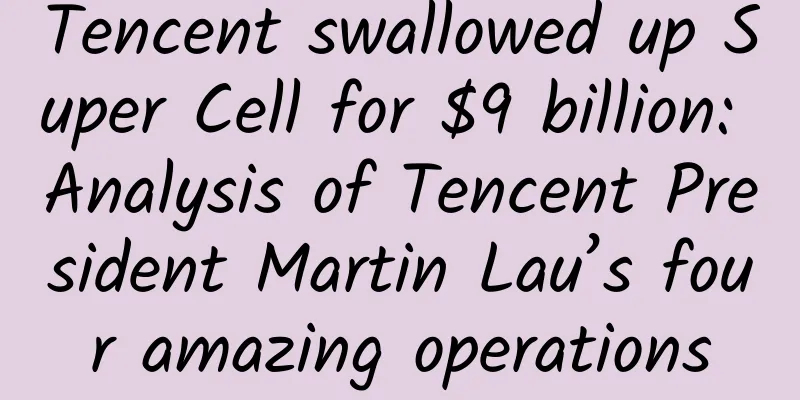Tencent swallowed up Super Cell for $9 billion: Analysis of Tencent President Martin Lau’s four amazing operations

|
After the Hong Kong stock market closed on the 21st, Tencent announced that it would acquire 84.3% of Super Cell's shares. The price offered even exceeded the $9 billion valuation previously reported by the Wall Street Journal, reaching a valuation of $10.2 billion. The total acquisition amount will reach $8.6 billion. It should be noted that, unlike most domestic media reports, Tencent’s announcement showed that the acquisition was completed by a buyer group led by Tencent. Tencent stated in the announcement that it expects to invest US$3-4 billion in the entire acquisition group, and the remaining funds will be filled by other players in the buyer group and bank loans. Despite this, Tencent's acquisition is still a stunning deal. Some reports point out that this is the largest cross-border acquisition by a domestic Internet company to date. It should be noted that when Tencent acquired 15% of JD.com's shares, it only paid more than 200 million US dollars, and it was more of a cash-out of Tencent's e-commerce business in the form of asset cleansing. Such a large amount of money was used to acquire an overseas game company, and it was personally handled by Tencent President and capital operation expert Liu Chih-ping. There are quite a lot of magical operations behind this. "Penguin Ecology" analyzes it based on its own understanding: Magic operation 1: Tencent first urgently finalized the acquisition and then went to find money Tencent hopes to operate the acquisition in the form of a buyer group, but as of the time of the announcement, Tencent's buyer group has not yet been formed. This means that Tencent will first finalize the acquisition with Super Cell and then look for money. Earlier reports from the Wall Street Journal and Bloomberg stated that Tencent has finalized a bank loan of US$4.4 billion and is trying to attract Hillhouse Capital and others to join the buyer group, which also proves that the buyer group will be established later. It is a bit risky for Tencent to finalize the acquisition first and then look for money. Financial experts are always extremely sensitive to risks. Liu Chih-ping is willing to bear this risk cost, which also means that the matter is somewhat urgent. Considering the previous information that Alibaba also wanted to acquire Super Cell, plus the good relationship between Jack Ma and Masayoshi Son, Alibaba and SoftBank, and the considerable premium of Super Cell's final transaction amount, it proves that Tencent's acquisition of Super Cell is a bit like pulling teeth from a tiger's mouth. So is it possible that Tencent will fail in its attempt to form a buyer group, thus bringing risks to itself? The answer is that it is theoretically possible, but not in practice. The buyer group led by Tencent to acquire Super Cell is a high-quality project no matter how you look at it. Looking at the poor projects in the domestic primary market, you will know that there are plenty of funds in China willing to play with Tencent. Magic operation 2: Buyer group structure design reduces Tencent’s risk In the acquisition, Tencent adopted a buyer group structure, which means that Tencent set up an isolation layer between itself and the Super Cell, and the Super Cell reported to the buyer group. Tencent's move is seen by the "Penguin Ecosystem" as a way of reducing risk. The biggest risk of industry mergers and acquisitions is always after the merger and acquisition. SoftBank's sale of Super Cell was largely due to the huge investment in Sprint that dragged itself into a quagmire. Tencent is the one who knows best the problem of gaming CPs declining over the past five years. There is the overseas case of Zynga's market value shrinking by 80%, and there are also domestic cases of Shanda, Changyou, Giant, etc. Mobile CPs such as Boyaa Interactive and Linekong Online have fallen like dogs, and Touch Technology has even found it difficult to go public. Game companies lack a fulcrum. The success of releasing hit games is a matter of luck and strength. No one can predict when game developers will lose their magic. It is true that Super Cell has a huge cash flow now, but it is hard to say whether Super Cell will continue to grow or shrink in three years. The game market is ever-changing. If VR really dominates the world and Super Cell cannot keep up, the profits that Super Cell will eventually bring to Tencent may not even cover the acquisition funds today. How to resolve the risk? Tencent set up a buyer group as a buffer zone. On the one hand, Tencent released its shares, and other buyers and banks jointly invested and shared the risk, so as not to put Tencent under too much financial pressure. On the other hand, Tencent’s announcement also made it clear that the loan was made by the buyer group rather than Tencent. This means that if Super Cell really goes bankrupt one day, the buyer group will at most dismantle Super Cell when repaying the debt, and Tencent will not be affected. But banks are not stupid. The cost of funds for a buyer group to borrow money is not the same as that for Tencent to borrow money. Of course, there is too much "dumb money" in China now, which also supports Tencent's somewhat "rogue" buyer group structure design. In addition, another purpose of Tencent setting up a buyer group is to bundle the interests of more shareholders. As all shareholders, they will naturally work together for the development of Super Cell. For example, if Hillhouse Capital enters the buyer group, the resources of its investment portfolio can naturally be used by Super Cell. Magic operation three: Controlling the buyer group and merging Super Cell into Tencent’s financial report Tencent can release a lot of benefits for the buyer group. If possible, Martin would like Tencent to pay less money and hold less shares. But there is one goal that Tencent must achieve, which is to merge Super Cell into Tencent's financial report. The original document of the Hong Kong Stock Exchange stated: After the potential co-investors join the Consortium, the Company currently expects to maintain a 50% voting interest in the Consortium through financial instruments (some of which have redemption rights). In accordance with the relevant international accounting standards, the Company will record dividends or distributed profits (if any) in the Consortium as dividend income in the income statement. The core message is that Tencent must hold a controlling stake in the buyer group. The significance of holding a stake is that according to international accounting standards, the buyer group (Super Cell) will be merged into Tencent’s financial statements. At this point, there is finally room for Super Cell to appear. Let me first give a brief introduction to Super Cell, a Finnish mobile game company. It has developed mobile games such as the recently popular "Clash Royale" and "Clash of Clans" (COC). Although there are not many products, each of Super Cell's works is a super juicer. In 2015, Super Cell's revenue was US$2.33 billion, and its net profit reached US$964 million, with a net profit margin of 41%. Compare Tencent's financial data. In 2015, Tencent's total revenue was 102.863 billion yuan (15.841 billion US dollars), net profit was 29.108 billion yuan (4.483 billion US dollars), and net profit margin was 28%. In 2015, Super Cell's revenue was 14% of Tencent's, and net profit was 20% of Tencent's. In 2015, Tencent's mobile game revenue was 21.3 billion yuan, about 3.2 billion US dollars. Super Cell played three games with 180 people, and achieved results close to Tencent Interactive Entertainment's several thousand people. This data was included in Tencent's financial statements, and the stimulating effect on the stock price was really "stimulating". At the same time, the income from Super Cell is also crucial to Tencent at this stage. After switching from PC games to mobile games in 2014 and tapping the potential of WeChat advertising traffic in 2015, Tencent's revenue and profit growth slowed down after entering 2016. The inclusion of Super Cell in the financial statements has put Tencent's financial data into a state of rapid growth again. Magic operation 4: Taking advantage of the differences between Chinese and foreign capital markets A key factor in Tencent's ability to leverage Super Cell is that Tencent's current P/E ratio is as high as 47.3 , while Super Cell's P/E ratio is 10 times based on the acquisition price. Every penny Tencent makes from the acquisition of Super Cell can be doubled back from the market value. At present, the domestic capital market is obviously overheated, and the pursuit of technology and Internet companies is even more blind. Major Internet companies are making full use of the advantages of the domestic capital market. Some, such as 360, are returning to the A-share market, and some, such as LeTV and Baofeng, have always been called playing with concepts in the technology circle. There is also Baidu selling its video business to an A-share listed company, and Suning is even going abroad to acquire a declining football club. In essence, they are all enjoying the dividends of the domestic capital market where "stupid people have a lot of money". Frankly speaking, Tencent has always been quite greedy. Its capital operation behavior has always been basically based on business needs rather than blindly acquiring assets. This acquisition of Super Cell is also more from a business perspective, while taking advantage of the dividends of the domestic financial market. In addition, the acquisition of Super Cell is also a good thing for Tencent to relieve the pressure on its cash reserves. As of Q1, Tencent had a cash reserve of 27.4 billion yuan. With the continuous depreciation of the RMB in China, the acquisition of Super Cell can be exchanged for US dollars that will be continuously recovered from the world in the next few years. This is another amazing operation that I, as a Penguin, can only slightly understand. As a winner of Toutiao's Qingyun Plan and Baijiahao's Bai+ Plan, the 2019 Baidu Digital Author of the Year, the Baijiahao's Most Popular Author in the Technology Field, the 2019 Sogou Technology and Culture Author, and the 2021 Baijiahao Quarterly Influential Creator, he has won many awards, including the 2013 Sohu Best Industry Media Person, the 2015 China New Media Entrepreneurship Competition Beijing Third Place, the 2015 Guangmang Experience Award, the 2015 China New Media Entrepreneurship Competition Finals Third Place, and the 2018 Baidu Dynamic Annual Powerful Celebrity. |
Recommend
Green plums, the ultimate romance of the Chinese people
Written by Wei Shuihua The Latin scientific name ...
Is there a black hole at the center of the Milky Way? The photo was just revealed!
Do you like reading comics? What? Do you want to ...
iOS Development - Abstract Protocol of App Architecture
From the perspective of architectural design, an ...
Who are the top advertisers in January? Industry Overview
According to the mobile advertising intelligence ...
The latest ranking of 2018! Data from 39 information flow platforms are released!
The latest traffic rankings for the major popular...
Millions of IPs Create Popular Science and Technology Talents to Strengthen the Country丨Exploring the Secrets Deep in the Earth: "Crust No. 1" 10,000-meter Drilling
Exploring the unknown and pushing the limits are ...
Everyone's Disease Class: 40 Lectures on Medical Thinking
Everyone's Disease Class: 40 Lectures on Medi...
How much does it cost to join Baidu AiPurchasing? How can I join Baidu AiPurchasing?
In October 2018, Baidu launched the enterprise B2...
How much does it cost to customize the Bijie learning mini program? Bijie learning applet customization price inquiry
There is no fixed price for the customization of ...
Microsoft announces new progress in Flutter support for foldable devices
Microsoft has released an update on supporting th...
After eating hot pot for several days, the whole family went to the hospital! Doctors urgently remind
As the weather gets colder, hot pot has become a ...
How to attract traffic to Douyin store? How to promote and attract traffic to Douyin store?
Now, more and more businesses are opening stores ...
How to plan an efficient marketing operation plan?
Based on my own experience, I shared how the mobi...
Do you always feel that your cat is not right? Be careful...it may be mentally ill
Key Points ★ From a human psychology perspective,...
World Cycling Day丨The secret of balance in small wheels: you only need strength and you to make the bicycle run smoothly
Produced by: Science Popularization China Author:...









